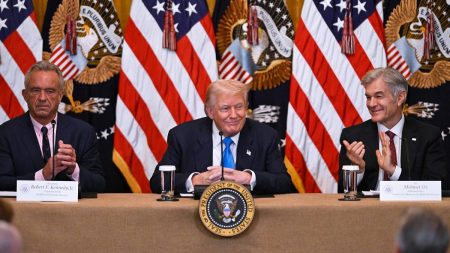Dr. Jay Bhattacharya has been selected by President-elect Donald Trump to lead the National Institutes of Health (NIH), a pivotal choice that underscores the potential for significant changes in U.S. medical research and public health policy. Bhattacharya, a renowned health economist and a vocal critic of lockdowns and vaccine mandates during the COVID-19 pandemic, has been noted for his unique approaches to health crises. As a prominent figure at Stanford University School of Medicine, his appointment reflects a shift toward prioritizing alternative perspectives in pandemic management, particularly those advocating for less restrictive measures. Trump commended Bhattacharya’s credentials, stating he will work alongside Robert F. Kennedy Jr., Trump’s choice to head the Department of Health, to address America’s most pressing health challenges, restore NIH to its former prestige, and foster important medical discoveries.
The National Institutes of Health, with its budget of $48 billion, stands as the world’s largest biomedical research agency, funding studies and research on vaccines, cancer treatments, and other significant health issues. Bhattacharya’s new role will involve directing significant resources toward investigating chronic diseases and advancing public health initiatives. The NIH allocates funding through competitive grants for research across various institutions in the U.S. and participates in direct research, utilizing the expertise of thousands of scientists in its employ. Over the years, NIH-supported research has led to pivotal medical advancements, such as innovative treatments for opioid addiction, vaccines for cervical cancer, cutting-edge cancer therapies, and the rapid development of mRNA vaccines during the COVID-19 pandemic.
Bhattacharya’s selection comes amidst ongoing debates about the efficacy and consequences of health policies implemented during the COVID-19 pandemic, where he gained notoriety as a co-author of the controversial Great Barrington Declaration. This declaration, published in October 2020, argued against lockdowns, asserting they inflicted irreparable damage to both individuals and the economy. It promoted the notion of achieving herd immunity through natural infection among low-risk populations while emphasizing protection for those more vulnerable. While the declaration attracted support from some factions of the Trump administration, it faced fierce criticism from public health authorities, including former NIH director Dr. Francis Collins, who labeled it dangerous and contrary to mainstream scientific understanding.
Bhattacharya has consistently maintained that the lockdown measures enacted to control the spread of COVID-19 were a grave mistake, asserting that they may have done more harm than good. His comments during a panel discussion in March 2021 illustrated his perspective that the lockdown policies adversely affected public health. The subsequent embrace of Bhattacharya’s views by some senior officials within the Trump administration highlights the politically charged atmosphere surrounding public health decisions in the U.S. and reflects the ongoing polarization of opinions on pandemic management among public health experts and politicians alike.
In light of Bhattacharya’s appointment, he has expressed his eagerness to undertake comprehensive reforms to restore public trust in American scientific institutions. Emphasizing the importance of confidence in scientific endeavors, Bhattacharya articulated his commitment to utilizing excellent scientific evidence to catalyze improvements in public health. His selection marks an important phase in Trump’s administration as it prepares for the upcoming term, signifying a potential pivot toward prioritizing alternative health policies and approaches in response to the pandemic. The success of Bhattacharya’s nomination, however, is contingent on Senate approval, alongside other key appointments, including Kennedy and notable figures such as Dr. Mehmet Oz and Dr. Marty Makary, who are poised to take on central roles in shaping U.S. health policy in the near future.
Overall, Bhattacharya’s leadership at the NIH could herald a transformative period for medical research in the United States, particularly as he seeks to steer the agency’s priorities towards understanding and addressing chronic illnesses. This ambition could lead to influential discoveries that may significantly alter the landscape of public health and medical practice. Should he succeed in aligning NIH research with his vision for reform, it could reshape the dialogue around public health policy, especially in relation to the contentious approaches taken during the pandemic. Given the historical context of the NIH’s role in fostering groundbreaking medical research, Bhattacharya’s appointment will be closely monitored for its implications on the future of health policy, the response to chronic diseases, and broader public health strategies in the coming years.














